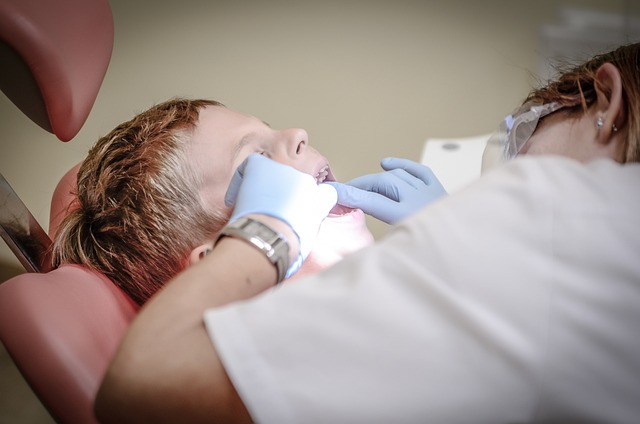Long-lasting Numbing After Tooth Extraction: All You Need to Know
Are you worried about experiencing long-lasting numbness after a tooth extraction? Don’t fret! In this article, we will delve into the world of post-extraction numbness, exploring???? its causes, duration, and treatment options. While it may sound intimidating, we’ll provide you with all the information you need in a friendly and informative manner. So sit back, relax, and let’s unravel the mysteries surrounding long-lasting numbness after tooth extraction!
1. Understanding Long-lasting Numbing after Tooth Extraction: A Common Experience
????
???? Experiencing numbness after a???? tooth extraction is a ????frequent occurrence that can leave you feeling puzzled???? or concerned. Rest assured, it is generally normal and???? part of the body’s healing process. Here’s a helpful overview to shed some ????light???? on this common experience.
1. Nerve Trauma: During the extraction, the nerves surrounding the tooth may sustain slight trauma, resulting in temporary numbness. This typically resolves within???? a few days or weeks as the nerves begin to ????regenerate.
2. Prolonged Anesthesia: Dental procedures often involve the use of local anesthesia, which can ????cause???? prolonged numbness. The duration of numbness depends on various factors such as your body’s metabolism, the type of anesthesia used, and the complexity of the extraction. Generally, the effects wear off within a few ????hours, but in some cases, numbness can persist for several hours or even???? days.

2. Why Some Patients Experience Prolonged Numbness after Tooth Extraction
Experiencing numbness ????after a ????tooth ????extraction is a common occurrence and???? often subsides within a few hours or days. However, in some cases, patients may continue to feel numbness for a prolonged period. While this can be unsettling, it is important to understand that there are several factors that can contribute to this extended sensation of numbness.
One possible reason for prolonged numbness is the proximity of the extracted tooth???? to a nerve. During a tooth extraction, it is possible for the???? dentist to come into contact???? with the nerves in the surrounding area, leading to temporary damage or inflammation. The affected nerve may take longer to heal, resulting in a prolonged sensation of numbness. Another factor to ????consider ????is the extent of the dental procedure. Complicated extractions, especially those involving impacted teeth or surgical removal, can increase the likelihood of prolonged???? numbness. Additionally, individual variation in healing processes???? can also affect the duration of numbness. While the majority of patients recover sensation within a short ????period, some individuals may experience a slower healing process, leading???? to a longer period of numbness.
If you’ve ever experienced long-lasting numbness after a medical procedure, you might be wondering what’s behind this peculiar sensation.???? Numbing agents, such as local anesthetics, are commonly ????used during surgeries or dental treatments to block pain signals from ????reaching the ????brain. But why ????does the numbness sometimes persist long after the procedure? ????Let’s dive into the fascinating science behind this phenomenon! 1. Increased Dosage: In some cases, the medical professional might administer a higher dose of anesthetic than necessary to ensure the utmost comfort???? during the procedure. While this is done with good intentions,???? an ????excessive amount of anesthesia???? can affect the nerve fibers, causing prolonged numbness. It’s important to remember that each individual responds differently ????to anesthetics. 2. Nerve???? Irritation: The process of injecting or ????applying numbing agents can sometimes ????cause temporary???? irritation to the nerves. This irritation can result in the continuation of numbness even ????after the effect of the anesthetic has worn???? off. Fortunately, nerve ????irritation typically resolves on its own within a few days or weeks.
If you’ve recently undergone a tooth extraction procedure, it’s important to be aware of certain factors that may contribute to prolonged numbness ????in???? the affected area. While???? temporary numbness is normal and expected after a tooth ????extraction, if???? the numbness persists for an extended period, it could be indicative???? of underlying issues. Here are some common factors that might influence prolonged numbness post-extraction:
By being aware of these common factors, you can have a better understanding of what might be causing your prolonged numbness after tooth extraction. Remember, it’s always best to consult with a dental professional if you’re experiencing any concerns or abnormal sensations ????post-extraction.
When???? it???? comes to numbness after???? dental procedures, there are two main types: temporary numbness and long-lasting numbing. Understanding the difference between the two can help patients know what to ????expect and how to manage their discomfort. Temporary numbness: Long-lasting numbing: ???? By understanding the differences between temporary numbness and long-lasting???? numbing, patients can alleviate any concerns and ensure appropriate care for their oral health. Remember, most numbness after dental procedures is temporary and will resolve on its???? own, but if you are experiencing prolonged symptoms, it’s always best to consult???? with your dentist. Experiencing extended numbness???? after a tooth extraction can be uncomfortable, but there are several???? tips that can ????help ????you manage this discomfort more???? effectively. Here are some suggestions:

5. How Long-lasting Numbing Differs ????from Temporary Numbness after Dental Procedures
Additionally, it’s essential to maintain good oral hygiene and???? avoid any activities that could interfere with the healing process.???? Remember to follow your dentist’s instructions and contact them if your numbness continues beyond a few days or if you experience other concerning ????symptoms. Keep in mind???? that every individual’s healing process is unique, and with proper care, the numbness should gradually subside, allowing you to get back to feeling normal soon.
7. Seeking Professional Advice: When to Consult Your Dentist about Prolonged Numbness
If you are experiencing prolonged numbness in your mouth or face, it is important to consult your ????dentist as soon as possible. While temporary numbness is common after dental procedures such as fillings or extractions, extended periods of numbness can be a sign of a more serious underlying issue. Here are some situations in which it is recommended to seek professional advice:
-
-
Persistent numbness after dental treatment: ????If the numbness in your ????mouth or face persists beyond the expected recovery time after a dental procedure, it is advisable to schedule an ????appointment with your dentist. They will be able to assess the situation and determine if any further action is necessary.
-
Numbness accompanied by other symptoms: If you experience additional symptoms along with your prolonged numbness, such ????as pain, difficulty swallowing, or changes in taste, it is???? important to consult your dentist.???? These symptoms may indicate an infection, nerve damage, or another dental problem that requires professional attention.
- Medical conditions or medications: Certain medical???? conditions or medications can increase the risk of complications and prolonged numbness after dental procedures. If you have a pre-existing medical condition ????or take medications that may impact your dental health, it is advisable to inform your dentist and consult them about any prolonged numbness you may be experiencing.
????
Remember, your dentist is there to help you maintain your oral health and provide appropriate care. Don’t hesitate to reach out to them if you have concerns or questions about prolonged numbness in your mouth or face. Seeking professional advice ensures that any underlying issues are addressed promptly and effectively.
8. Exploring Treatment Options for Long-lasting Numbing after Tooth Extraction
Experiencing prolonged numbness after a tooth extraction ????can surely be a cause for ????concern. While some numbness immediately following the procedure is normal, if it persists for an???? extended period, it is essential to explore potential treatment options. Although every case is unique, there are several approaches you can consider to alleviate this???? discomfort and regain sensation in the affected area.
1. Oral Medications: Your dentist???? may prescribe specific medications to manage nerve-related pain and promote the???? regeneration of damaged ????nerves. These medications can ????help reduce inflammation, alleviate ????discomfort, and ????stimulate nerve ????recovery.
2. Physical Therapy: In some cases, physical therapy exercises targeting the affected area can assist in stimulating blood flow and nerve regeneration. Physical therapists can guide you through specific exercises and techniques to promote faster healing ????and improve sensation.
9. The Road to Recovery: Understanding the Healing Process in Relation to???? Prolonged Numbness
In the journey towards recovering from prolonged numbness, it’s crucial to understand the healing process involved. Whether you’re experiencing numbness in your hands, feet, or any other ????part of your body, regaining sensation requires patience and a comprehensive approach. Here are some???? key aspects to consider along the road to recovery:
????
1. Identifying the root ????cause:
????
Before embarking on the healing process,???? it’s essential to determine the underlying cause of your numbness. It may be due to???? nerve compression,???? poor circulation,???? injury, or a medical condition like diabetes or multiple sclerosis. Consulting with a healthcare professional, such as a neurologist or physical ????therapist, can help diagnose the root cause and develop ????an appropriate treatment plan.
2. Incorporating physical ????therapy:
Physical therapy plays a crucial role???? in ????recovering sensation and restoring function after prolonged numbness. Your healthcare provider may prescribe exercises and stretches that target specific muscle groups, improve blood flow, and ????stimulate nerve regeneration. It’s important to follow the prescribed regimen consistently and communicate any discomfort???? or progress to your physical therapist. In addition to exercises, techniques like massage, heat therapy, and electrical stimulation may also???? be employed to aid in the healing process.
10. Important Precautions to Take for a Speedy Recovery after Tooth Extraction
After a tooth extraction, it is crucial to take certain precautions to ensure a speedy recovery and???? minimize???? discomfort.???? Here are some important???? tips to follow:
- Limit strenuous activities:???? Avoid any vigorous physical activities or exercise for at least 24-48 hours after the extraction. This will help prevent bleeding and promote healing.
- Apply an ice pack: Use an ice pack wrapped in a cloth to gently apply on the affected area for 10-15 minutes at a ????time. This will help reduce swelling and manage any pain or discomfort.
- Take prescribed pain medications: Your dentist may recommend over-the-counter pain relievers or prescribe stronger medications. Make sure to follow their instructions carefully to alleviate any post-extraction pain.
Furthermore, it is crucial to maintain good oral hygiene to prevent any complications during your recovery period:
- Gently ????rinse your mouth: After 24 hours, rinse your mouth gently with warm saltwater after meals. This will help keep ????the extraction site clean and promote healing.
- Stick to a soft food diet: For the first few days, opt for soft and easy-to-chew foods ????like soups, mashed potatoes, yogurt, and smoothies. Avoid hot and ????spicy foods that can ????irritate the extraction site.
- Avoid using straws: As sucking on a straw can dislodge the blood clot and delay healing, it is best to avoid using them for at least 24 hours.
By following these important precautions and???? maintaining proper oral care, you can make your recovery process after a tooth extraction???? as comfortable and ????quick as possible.
Frequently Asked???? Questions
Q: What is long-lasting numbing after???? tooth???? extraction?
A: Long-lasting numbing refers to prolonged numbness experienced after a tooth extraction procedure. It???? is a common side effect that may last for several hours or even days following dental surgery.
Q: How does the numbing sensation occur after tooth extraction?
A: During a tooth extraction, a local anesthetic is injected into the ????gums to numb the area. This prevents you from feeling any pain during the procedure. However, the effects of the anesthesia can sometimes linger even???? after the surgery is completed, leading to prolonged numbing.
Q: Is long-lasting numbing after tooth extraction a cause for concern?
A: In most cases,???? long-lasting numbing is not a cause for concern. It is a temporary side effect of the anesthetic that is???? gradually ????metabolized???? and eliminated???? by the body. However, it is always best to consult with your dentist if you have any concerns or if the numbness persists for an extended period.
Q: How long does the numbing sensation typically last after tooth ????extraction?
A: The duration of the numbing sensation can vary from person to person. Most commonly, the anesthesia wears off within a few hours after the procedure. However, in some cases, it can last up to 24 hours or even longer. If prolonged numbness persists for more than a day, it is advisable to seek advice from your dentist.
Q: Can long-lasting numbing???? after tooth extraction affect daily activities?
A: It is possible for long-lasting numbing after tooth extraction to impact daily activities, particularly eating and drinking. The ????numbness may cause???? difficulty in properly chewing food or controlling the???? temperature of beverages. It is ????advisable to consume soft ????foods and avoid hot drinks until???? the numbness subsides.
Q: How can I manage the discomfort associated???? with long-lasting numbing after tooth extraction?
A: There are a few ways to manage discomfort caused by prolonged ????numbing. Firstly, avoid chewing on the affected side and consume soft foods that don’t require much effort. Secondly, be cautious while drinking hot beverages to prevent accidental???? burns. Lastly, maintain good oral hygiene by gently brushing the area around the extraction site,???? being careful not to ????irritate it.
Q: When should I seek dental attention for long-lasting numbing after tooth extraction?
A: While long-lasting numbing is usually not a cause for concern, there are cases where you should seek dental attention. If the numbness persists for more than 24 hours, increases???? in intensity, or if you experience other unusual symptoms such as ????severe pain or???? bleeding, it is important to consult with your dentist???? promptly.
Q: Are there any risk factors that increase the likelihood of experiencing long-lasting numbing after tooth extraction?
A: Some factors may increase the chances of experiencing long-lasting numbing after tooth extraction, such as the complexity of the procedure, the use of multiple anesthetic injections, or certain medical conditions. Your dentist will be able ????to assess your specific situation and provide guidance accordingly.
Q: Can I take over-the-counter painkillers to alleviate the discomfort caused by long-lasting numbing after tooth???? extraction?
A: Over-the-counter painkillers, such as ibuprofen or acetaminophen, can be taken to help manage any discomfort experienced after tooth extraction. However, it is crucial to follow???? the recommended dosage and consult with your dentist or pharmacist if you have any concerns or???? existing medical conditions.
Q: Is long-lasting numbing after tooth extraction preventable?
A: Long-lasting numbing after tooth extraction ????is a normal side effect???? of dental surgery and may not always be preventable. However, you can minimize the chances???? of experiencing???? prolonged numbness by closely following your dentist’s instructions, especially regarding the medications and post-operative ????care recommended.
Conclusion
In???? conclusion, we hope this article has provided you with ????all the necessary information about long-lasting numbing after tooth extraction. While it is common to???? experience some level of numbness following the procedure, it is crucial to understand when to be concerned and when to give your body the time it needs to heal.
We have discussed the various causes and potential ????complications that may???? lead to prolonged numbness, such as nerve damage or infection. Remember that immediate professional assistance ????is essential if you notice significant, worsening, or persistent numbness ????beyond the expected timeframe.
However, most cases of numbness will subside gradually within a few hours to a few days. We have shared self-care tips to help you manage???? discomfort during this time, such as taking prescribed pain medication,???? using ice packs, and maintaining proper oral hygiene.
We also highlighted the importance of following ????post-extraction instructions provided ????by your dentist, including avoiding activities that could hinder the healing process, such as smoking or excessive physical exertion.
Your dentist is your best resource for ????evaluating your specific situation, so never hesitate to reach out to them and discuss any???? concerns???? or questions you ????may have. They ????will assess your condition and guide you through the appropriate steps to ensure a smooth recovery.
Remember, every individual’s experience with tooth extraction and numbness can vary. While it may be uncomfortable, rest assured that in most cases, long-lasting numbness is temporary and will resolve on???? its own. Patience, proper care, and open communication with your dentist will???? play a significant role in achieving a successful recovery.
We wish you a speedy recovery and hope this article???? has helped you ????feel more informed and at ease.???? Take care of yourself and your oral health, and don’t hesitate to seek professional advice when needed. Here’s to a future with a healthy, pain-free mouth!





